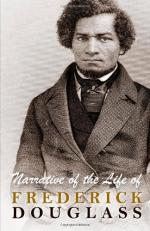|
This section contains 4,040 words (approx. 14 pages at 300 words per page) |

|
SOURCE: Lee, Lisa Yun. “The Politics of Language in Frederick Douglass's Narrative of the Life of an American Slave.” MELUS 17, no. 2 (summer 1991-92): 51-59.
In the following essay, Lee conducts a rhetorical analysis of Douglass's narrative as it progresses from the powerlessness of silence in the first half of the book to the power of speaking within the dominant discourse in the second half.
In the Narrative of the Life of an American Slave, Frederick Douglass recounts his rise from a black slave to an abolitionist leader. Douglass's eloquent book gives testimony to the cruelty that he and other slaves suffered. Not only is Douglass's writing eloquent and moving, it is also carefully planned and sophisticated. One can see that while addressing the evils of slavery, Douglass also addresses the universal issues of powerlessness resulting from the “social appropriation of discourse” (as Foucault terms it). Douglass demonstrates the...
|
This section contains 4,040 words (approx. 14 pages at 300 words per page) |

|


